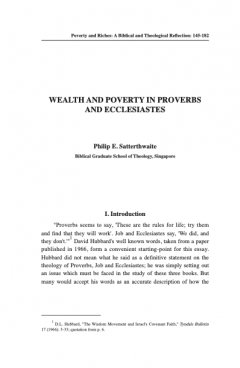WEALTH AND POVERTY IN PROVERBS AND ECCLESIASTES/Philip E. Satterthwaite
Philip E. Satterthwaite Principal of Biblical Graduate School of Theology, Singapore
ABSTRACT
For much of the past century there was a tendency to set Proverbs over against Ecclesiastes, the one being characterized as “conventional,” “establishment” wisdom teaching, the other as more “radical,” “questioning” and “paradoxical” in its approach and tone. In more recent years this has come to be regarded as something of an oversimplification, and unfair (in different ways) to both Proverbs and Ecclesiastes. An important question in the study of both Proverbs and Ecclesiastes is: how were readers supposed to respond to wisdom teaching (whether one-verse sayings as found in Pr 10-29 and Ecc 7 and 10 or longer discourses as found elsewhere in these books)? A hermeneutic that sees wisdom teaching as designed to stimulate further reflection rather than put an end to discussion may conclude that Proverbs and Ecclesiastes have more in common than has often been thought to be the case. This paper compares the teaching of Proverbs and Ecclesiastes on riches and poverty, and concludes that, while there are differences between the two books on this topic (both in what is said and how it is said), there is also significant overlap: both books have a clear sense of the benefits which wealth can bring and of the dangers that lie in wait for those who seek it too eagerly or use it wrongly once acquired.
撮要
過去一個世紀,許多學者喜歡將箴言和傳道書聯繫一起來研究,認為前者是「守舊」、「屬建制」的智慧教導,而後者則在寫作手法和語調上較「激 進」、「存疑」和「弔詭」。近年這觀點被認為過於簡化,對於箴言和傳道書 (在多方面)都不公平。在這兩本書卷的研究中,一個重要的問題是:讀者要 怎樣回應智慧的教導(無論是箴十∼二十九章或傳七和十章中的一節經文,還 是書中一段篇章較長的講論)?認為智慧教導的目的是要刺激進深反省,而非 立下定案終止討論的釋經進路,會發現箴言和傳道書比過往所以為的有更多共 通點。本文比較箴言和傳道書有關貧富的教導,發現即使兩卷書在這題目上存 有歧見(無論是講論的內容或講論的方式),還有重要的重複點:兩卷書都明 顯贊同財富能為人帶來好處,但人一旦過分追求財富,在得着財富後又錯誤使 用,則會危機四伏。
原載於《建道學刊》41期(2014年1月),頁 145-182。







